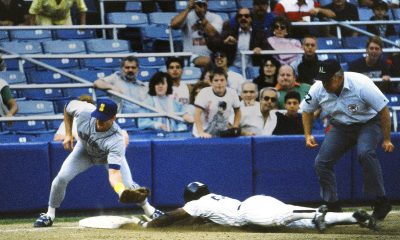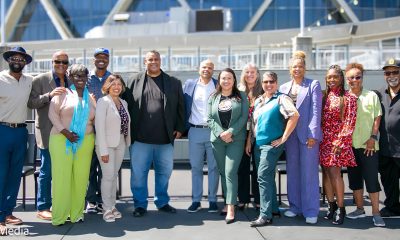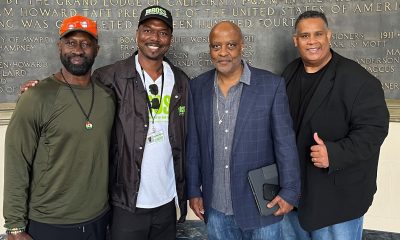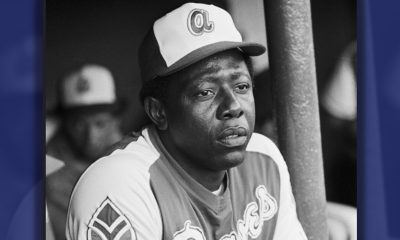Oakland A's
A’s Offense Backs Milone For Win
Oakland, CA – Doug Fister’s return to the mound was memorable for the A’s who knocked the right-hander out of the game after tossing four plus innings. After having a day off to regroup Oakland’s offense found it’s way back to O.Co.
The A’s dominated in their 8-0 victory over the Washington Nationals to open a three-game series. After coming off the 15-day disabled list, Fister’s debut was brutal after surrendering nine hits, seven runs and three home runs over 4.1 innings.
“Physically, I felt like I was in the right place today,” Fister said. “I felt strong, but it was a matter of lack of execution.”
Oakland got on the board first when Josh Donaldson singled on a ground ball to Fister who over threw first base. Donaldson advanced to third, Brandon Moss singled on a ground ball to right field scoring in Donaldson for the early 1-0 lead in the first inning.
“It was a terrible throw,” said Fister.
John Jaso went yard to leadoff the third extending the A’s lead 2-0. Oakland’s bats continued to come alive in the fourth when Yoenis Cespedes lead off the frame with a single. Josh Reddick followed with a single and on a wild pitch, Cespedes scored.
Then back-to-back home runs in the fifth sent Fister back to the dugout. Moss hit a two-run homer and Cespedes followed with a solo dinger to right field making the game 7-0. And Derek Norris added on another run with a RBI single bottom of the seventh.
The A’s played their first interleague game of the season and the win against Washington was the first in franchise history. The Nationals made their first appearance in Oakland since 2005. Another first for the A’s was hitting back-to-back home runs for the first time this season.
“This time I felt good early,” Tommy Milone said. “And that’s when you get your rhythm going. This was as good as it was against the Dodgers. I had some games like this in 2012, not so much in 2013.”
Facing his former team for the first time since being traded three years ago, Milone was simply stellar on the mound. He earned his first win of the season and went 8.0 innings or more for the sixth time in his career. Milone allowed just two hits, no runs, three walks and seven strikeouts.
“I don’t think he missed a location all night, he was fantastic,” said Derek Norris. “I think you can make the argument that’s the best I’ve seen him throw. He was very, very good.”
“He was awesome,,” Moss said. “That’s pretty much all I got.”
Bay Area
IN MEMORIAM: Oakland’s ‘Man of Steal,’ Baseball Icon Rickey Henderson, Dies at 65
Henderson’s wife, Pamela, said in a statement: “It is with profound sadness that we share the passing of my husband, Rickey Henderson. A legend on and off the field, Rickey was a devoted son, dad, friend, grandfather, brother, uncle, and a truly humble soul. Rickey lived his life with integrity, and his love for baseball was paramount. Now, Rickey is at peace with the Lord, cherishing the extraordinary moments and achievements he leaves behind.”
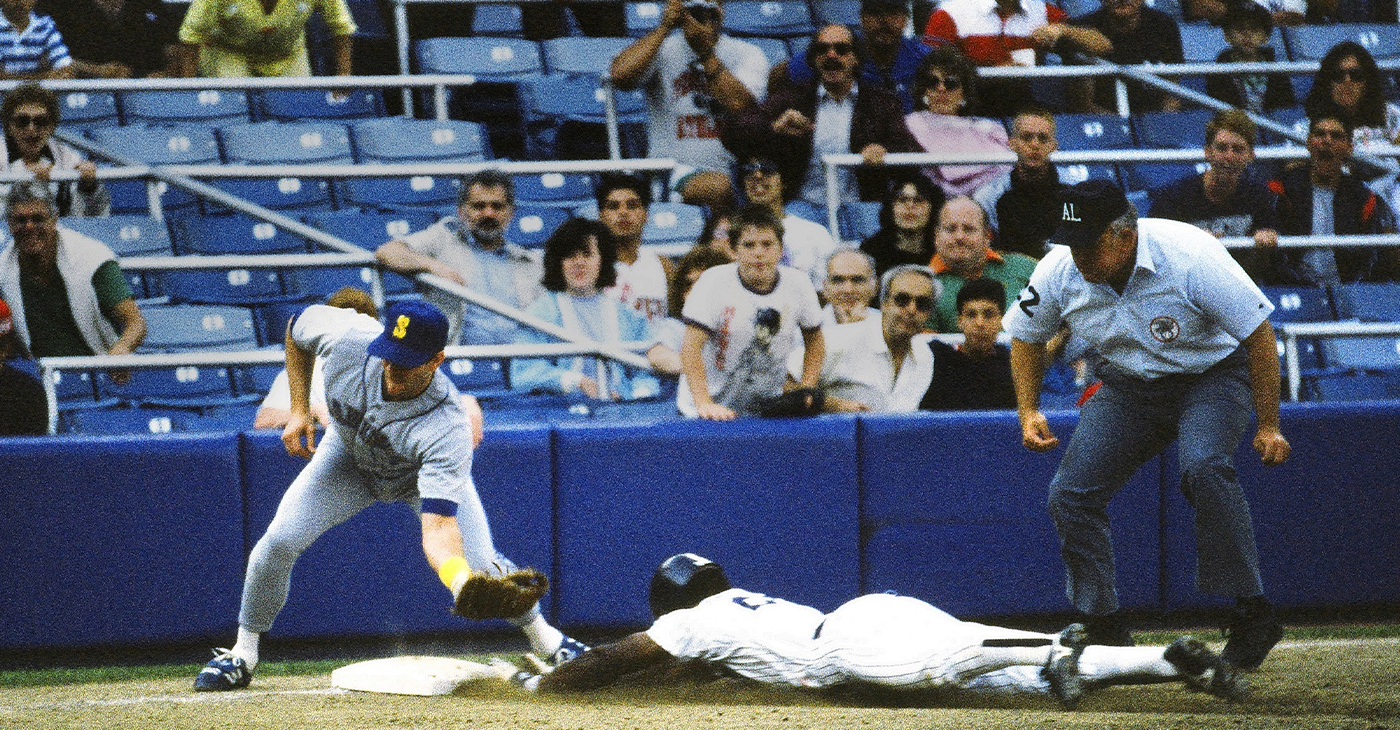
By Post Staff
Baseball legend Rickey Henderson, known as the ‘Man of Steal,’ passed away on Dec. 20 at UCSF hospital, reportedly from complications of pneumonia. He was 65.
Henderson’s wife, Pamela, said in a statement: “It is with profound sadness that we share the passing of my husband, Rickey Henderson. A legend on and off the field, Rickey was a devoted son, dad, friend, grandfather, brother, uncle, and a truly humble soul. Rickey lived his life with integrity, and his love for baseball was paramount. Now, Rickey is at peace with the Lord, cherishing the extraordinary moments and achievements he leaves behind.”
Newsbreak described the player as “a fearless, flamboyant style of play, which thrilled some players and fans thirsting for theatrical energy from a sport known for its staidness and irritated others who believed the iconoclastic approach disrespected old traditions. Henderson broke boundaries alongside reams of records during a 25-year career spent with nine teams.”
Those teams included the Oakland As, the New York Mets, the New York Yankees, the Toronto Blue Jays, the San Diego Padres, the Anaheim Angels, the Seattle Mariners, and the Boston Red Sox. A 10-time All-Star player and American League MVP in 1990, Henderson remains baseball’s greatest stealer of bases and was dubbed the “Man of Steal” during his playing time.
Henderson earned the title ‘Man of Steal’ because he stole 1,406 bases during his MLB career, a record that still stands with more than 468 stolen bases by Lou Brock, the next closest all-time base stealer at 938 stolen bases.
His last MLB game was in 2003, and he retired from the game in 2007, coaching in various positions for a few more years. He was inducted into the Baseball Hall of Fame in his first year of eligibility in 2009. His most recent public appearance in Oakland was with former teammate Dave Stewart when they threw out the first pitch at the last game the A’s played in the Coliseum in September.
Born in the back seat of an Oldsmoblie in Chicago, Illinois, on Christmas Day 1958, Henderson used to quip that he had always been fast. At age 7, the family joined his father, who had moved to Oakland. He graduated from Oakland Technical High School in 1976 where he was renowned for playing baseball, basketball, and football, which had been his favorite sport.
But his mother discouraged his intent to wear the Oakland Raiders’ silver-and-black uniform, saying football players had shorter careers and higher chances of injury.
Learning of Henderson’s death, Stewart was devastated. After competing against each in Oakland’s Babe Ruth League as teens, they got to play on the A’s together in 1989, winning the World Series over the San Francisco Giants which had been delayed by the Loma Prieta earthquake.
“Him having asthma, him being sick, it never stopped him,” Stewart told The Source. “He was always on the go. He had these rental properties in Oakland, and I’d get these calls saying they saw Rickey out cutting the grass. I’d say, ‘What do you mean?’ They told me he was actually out there with a lawn mower doing work on his property.
“He was always go-go-go. He loves to fish. He just took up hunting,” Stewart said.
Accolades poured in from Major League Baseball, the Oakland A’s, where Henderson played for a total of 14 years, and many other individuals, news and sports organizations.
“He was undoubtedly the most legendary player in Oakland history and made an indelible mark on generations of A’s fans over his 14 seasons wearing the Green and Gold,” the A’s management said in a statement.
“For those who knew him personally, Rickey was much more than a franchise icon and a Baseball Hall of Famer. He was a friend and mentor to every player, coach, and employee who passed through the Oakland Coliseum or played a game on the field that came to bear his name,” the A’s statement said.
NBC Bay Area reported that Oakland Interim Mayor, Nikki Fortunato Bas, and former San Francisco Mayor Willie Brown took to social media to share their condolences.
“Rickey Henderson was 1 of 1,” Bas wrote on X. “An Oakland legend and icon. A multi-sport star at Oakland Tech, a champion with the Oakland A’s and beloved by this community. I am heartbroken for his family and fans. We have reached out to the A’s to offer any assistance the City can provide.”
Brown said he compares Henderson’s legacy to the late San Francisco Giants Hall of Famer Willie Mays. “When he was on base, he disturbed every other player because nobody knew what he might do at any given moment,” Brown said.
But for all his showmanship Henderson often displayed a simple humility. When his childhood dream of becoming a millionaire was fulfilled with a $1 million signing bonus, Henderson framed the check and hung it on his wall instead of signing it, causing the team to insist he cash it and replace the check with a copy.
He is survived by his wife Pamela and his three daughters Angela, Adrianna, and Alexis.
The National Newspaper Association Newswire, The Source, NBC News Bay Area, USA Today, Wikipedia and statements from Henderson’s family and sports associations are the sources for this story.
Bay Area
Oakland Baseball Native Returned to the Bay to Give Back to The Town
He was diagnosed with a form of heart arrhythmias, which led to his release from the A’s. Unfortunately, other teams could not be convinced to take a chance on him due to heart problems, so he spent no more than a season with any organization over the next five years. In 2021, now heartbroken over what had transpired throughout his career, he decided to retire from playing baseball. Despite being frustrated, he wanted to have fun during his last season. “As an athlete, you never want to feel like the game is kicking you out. You want to walk away on your own terms,” Harris said. “I wanted to be in a position where I can transition my life from being a player to other opportunities.”
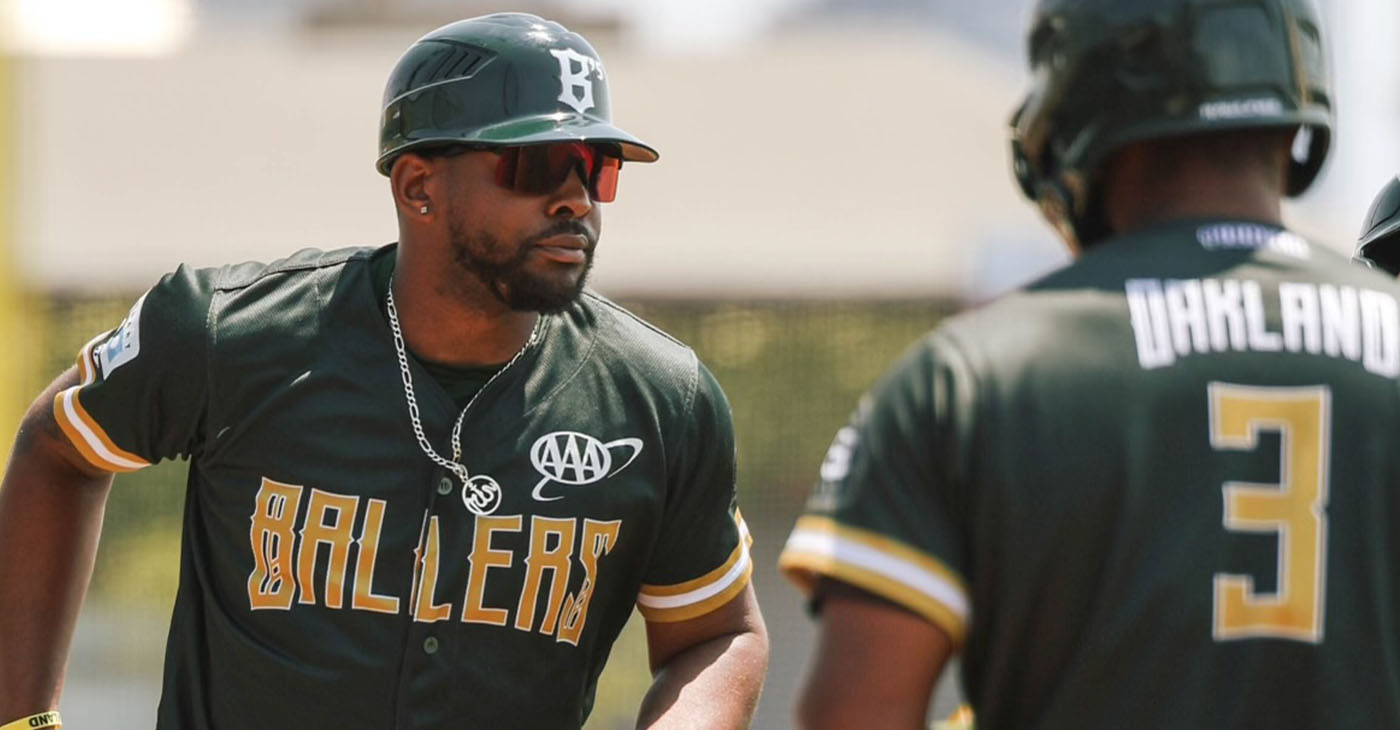
By Magaly Munoz
If anyone knows the struggles of breaking into minor league baseball, it’s James Harris.
Harris, an Oakland native, was drafted by the Tampa Bay Rays in 2011, starting a tumultuous 10-year career of jumping from one team to the next, and he had health problems that would hinder his career progress.
After dedicating almost his entire life to playing baseball, Harris never imagined he would be released and signed to 11 different teams over a decade.
“The experience is humbling,” Harris explained.
“I think that for most people, [the emotions] goes both ways, where you probably start off a little bit of anger because you feel like you’re better than other guys that are staying. But then you have to humbly look in the mirror and say, ‘Well, what do I need to do differently if given the opportunity again?’” Harris said.
Midway through his career, Harris experienced episodes of passing out while on the field, leading to several weeks of testing with multiple cardiologists. This caused him to miss six weeks of the season.
He was diagnosed with a form of heart arrhythmias, which led to his release from the A’s. Unfortunately, other teams could not be convinced to take a chance on him due to heart problems, so he spent no more than a season with any organization over the next five years.
In 2021, now heartbroken over what had transpired throughout his career, he decided to retire from playing baseball. Despite being frustrated, he wanted to have fun during his last season.
“As an athlete, you never want to feel like the game is kicking you out. You want to walk away on your own terms,” Harris said. “I wanted to be in a position where I can transition my life from being a player to other opportunities.”
And new opportunities were exactly what he found, and not too far away from the field he knew and loved.
Soon after leaving baseball, Harris began working with kids during his off time, coaching and training players of all ages. This evolved into coaching travel ball teams and eventually partnering with BJ Boyd, his former A’s teammate, to start their own training team called Backyard Boyz.
Boyd knew from the start that the partnership would be able to build something big to give back to the community.
Harris and Boyd understood how expensive and time consuming the sport was, on top of how confusing breaking into the big leagues would be for the young players who had the drive to move to the next level beyond high school. They provide kids with mentorship and opportunities to play in front of college scouts at little to no cost.
This is not about money or building themselves up at others’ expense, they want to see Oakland kids thriving with opportunities that are not easy to come by without families paying exorbitant fees.
The players love Harris, Boyd said, because he’s been in their shoes before, so he understands what it really takes to go to the next level. The kids look up to them because they dream of being where the two have already been.
“The motivation and the goal behind [Backyard Boyz] is to help be a platform and a resource for as many kids as possible. Everyone doesn’t have an advocate speaking on their behalf [like this resource],” Harris said.
Around the time of starting Backyard Boyz, Harris began working with a new pioneer league team, the Ballers, that came to Oakland during peak baseball desperation.
The A’s, Oakland’s major league baseball team since 1968, had just announced their plans to leave the city to find a new home in Las Vegas when the Ballers announced their plans to dig roots in the town. The B’s hoped to take away the doom and gloom that the A’s were leaving with fans and give locals something new to take pride in.
Oakland has gotten a reputation for losing professional sports teams. The longtime NFL team, Oakland Raiders, moved to Las Vegas in 2020, and the Golden State Warriors left their city arena empty to play across the bridge in San Francisco in 2019.
Harris first joined the growing B’s team as marketing and sales guy, promoting the team to locals and building up the hype the new team would bring. Midway through the teams first season, Harris was asked to step up as an assistant coach.
Because of his background in running baseball camps and playing in the minor league, the change of position seemed like a no-brainer to Ballers Manager Aaron Miles.
“[Harris] would hang around the batting cage and talk ball with the players. He was another knowledgeable baseball guy for players to lean on,” Miles said.
The Ballers finished their season by making it to the Pioneer League playoffs, but ultimately lost 6-4 to the Yolo High Wheelers in the first round.
Although the coaching is at different levels, Harris is honored to be a part of maintaining the legacy of Oakland sports at a time when fans are feeling discouraged. The Ballers and Backyard Boyz are allowing him to create impact in the lives of players who are at unique stages of their careers, whether that’s starting out in high school or trying to use the Pioneer League as a stepping stone into something bigger.
“It means a lot to me to be a part of [the Ballers] and to see how it’s directly impacted people. The amount of people I’ve met doing this, and working with the little leagues has been extremely humbling,” Harris said. “I think that this is going to be huge for the community.”
Bay Area
A’s Last Game in Oakland Ends Baseball Team’s 57-Year Tenure Congresswoman Barbara Lee’s Efforts to Save Team Blocked by GOP-Controlled House
After 57 years, the Athletics have left Oakland following a home series this week. Though Congresswoman Barbara Lee introduced legislation to keep the team in Oakland, she could not get the backing she needed from other legislators in the Republican-controlled House of Representatives.
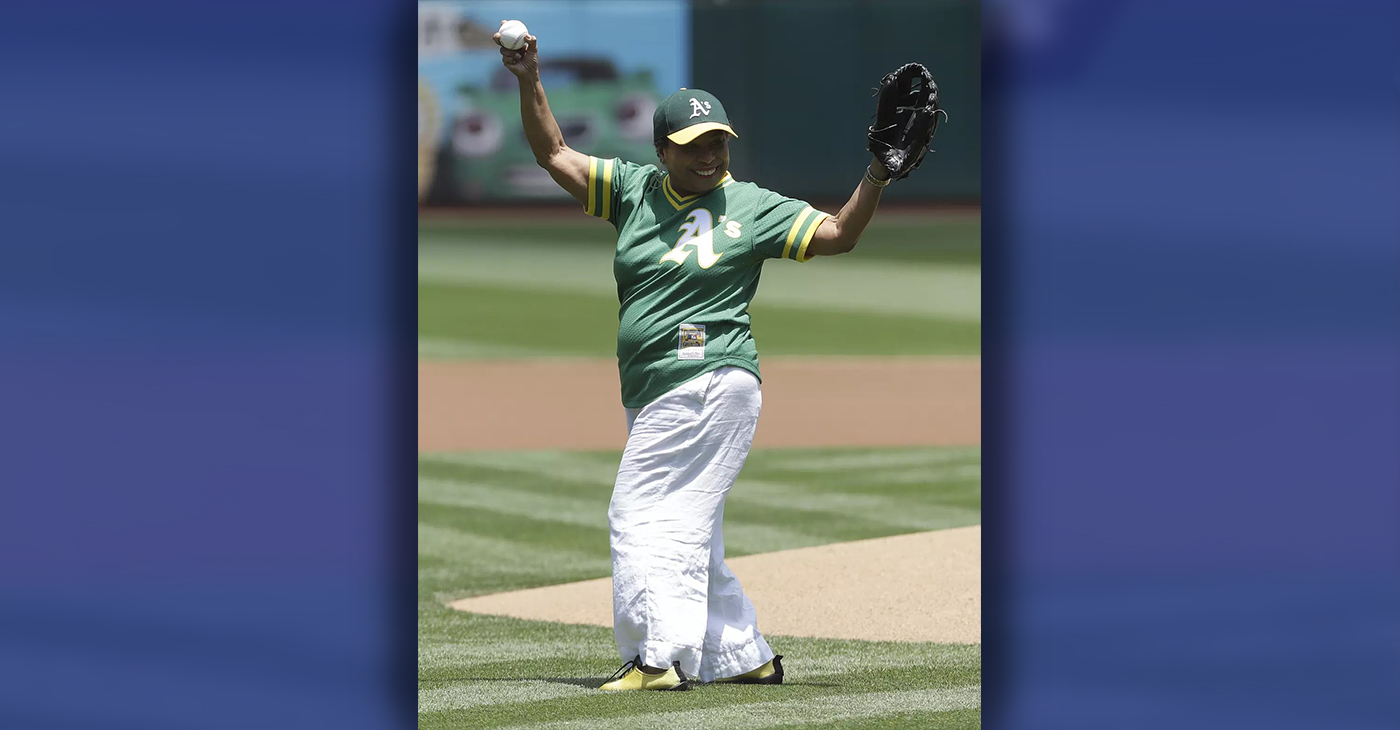
By Post Staff
After 57 years, the Athletics have left Oakland following a home series this week.
Though Congresswoman Barbara Lee introduced legislation to keep the team in Oakland, she could not get the backing she needed from other legislators in the Republican-controlled House of Representatives.
Lee tried 15 months ago, the day before Nevada politicians approved $380 million in public funds to build a Las Vegas ballpark. Lee proposed a bill that would have stopped the A’s move by requiring a hefty exit fee that would have made them reconsider a move.
“That’s only fair,” Lee said in an interview in the Los Times by sportswriter Bill Shaikin. “That’s the only fair way to do it,” she said. “You’ve got to compensate the community, because the community has invested a heck of a lot.”
However, Lee’s bill could not go forward without the backing it needed. First, it went to the House Judiciary Committee chaired by Rep. Jim Jordan, the Ohio Republican. Jordan did not co-sponsor Lee’s bill or permit the committee hearing required for the bill to move forward.
“We put up a good fight. The city put up a good fight, the county, everyone,” said Lee.
“Unfortunately, we are losing a team that really, in the day, exemplified Black excellence in Oakland. It’s more than just the team leaving. It’s a part of Oakland’s history, and our culture,” she said.
-

 Bay Area3 weeks ago
Bay Area3 weeks agoPost Salon to Discuss Proposal to Bring Costco to Oakland Community meeting to be held at City Hall, Thursday, Dec. 18
-

 Activism3 weeks ago
Activism3 weeks agoMayor Lee, City Leaders Announce $334 Million Bond Sale for Affordable Housing, Roads, Park Renovations, Libraries and Senior Centers
-

 Activism4 weeks ago
Activism4 weeks agoOakland Post: Week of December 10 – 16, 2025
-

 Activism3 weeks ago
Activism3 weeks agoOakland School Board Grapples with Potential $100 Million Shortfall Next Year
-

 Arts and Culture3 weeks ago
Arts and Culture3 weeks agoFayeth Gardens Holds 3rd Annual Kwanzaa Celebration at Hayward City Hall on Dec. 28
-

 Activism3 weeks ago
Activism3 weeks ago2025 in Review: Seven Questions for Black Women’s Think Tank Founder Kellie Todd Griffin
-

 Advice3 weeks ago
Advice3 weeks agoCOMMENTARY: If You Don’t Want Your ‘Black Card’ Revoked, Watch What You Bring to Holiday Dinners
-

 Activism3 weeks ago
Activism3 weeks agoAnn Lowe: The Quiet Genius of American Couture


